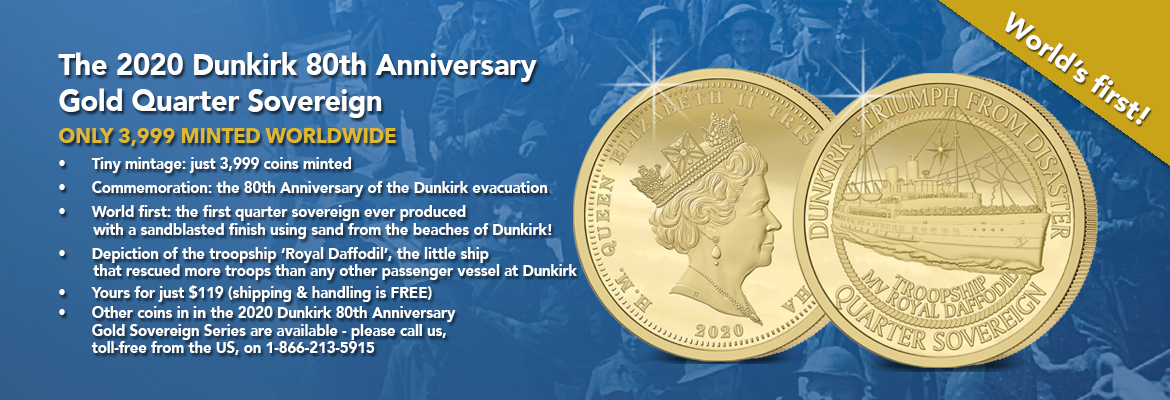
Our 2020 Dunkirk 80th Anniversary Gold Sovereign Range commemorates the remarkable rescue of Allied troops from the beaches of Northern France, sometimes known as ‘Operation Dynamo’.
The Gold Quarter Sovereign in particular, features a design that pays tribute to the MV Royal Daffodil, a passenger vessel that undertook no fewer than seven trips to the beaches of Dunkirk in 1940 and rescued up to 9,500 troops. On the final trip, a bomb went right through her hull and exploded beneath her; the hole was plugged with a mattress and she made it home. After the War she was refitted and proudly bore a plaque that commemorated her as a ‘Dunkirk Little Ship’.
We are taking a closer look at the Troopship Royal Daffodil and everything you need to know.
The Beginning
The Royal Daffodil was launched in 1939 and was the third ship to carry the name. The first ship to hold the name was a Mersey ferry built in 1906 named ‘Daffodil’, which was later taken over by the Royal Navy during World War I. She was then granted the ‘royal’ prefix by King George V for her service in the Zeebrugge Raid. In 1938, the vessel was sold for scrap in Belgium and replaced by a much larger vessel, aptly named ‘Royal Daffodil’.
A replacement was also built in 1934, given the II suffix, for continental trips from Tower Pier. Service commenced in 1939 with a trip to Calais.
Dunkirk and World War II
Initially, the royal Daffodil was used for the evacuations of over 4000 women and children from London to East Anglia. She then went on to carry troops of the BEF from Southampton to Cherbourg.
On 23 May, the Royal Daffodil, along with the passenger steamer Archangel, carried troops of the 30th Brigade to Calais. She was also one of the vital ships that took part in the Dunkirk evacuations in 1940, rescuing up to 9,500 men in seven long and gruelling trips. On her final trip on 2 June, a bomb passed through and exploded under her, caused a hole in the starboard side. This was patched with mattresses and wood, and she made it safely back to Ramsgate. As well as this final blow, she also survived machine gun and torpedo attacks along the way.
For the remainder of the war, the Royal Daffodil ran between Stranraer and Larne, carrying military personnel. During her wartime service, it was estimated that she carried almost 2,444,000 service personnel and covered over 200,000 miles.
Modern Day
After the war, the Royal Daffodil was refitted and then used on sailings from Gravesend to the French Coast. From 1954, she was again able to sail and land in France and continue a few seasons of this route.
The Daffodil was then used between 1957 and 1963 by Paul Lincoln, for live Rock musical entertainment. Unfortunately, these musical excursions proved to be unprofitable and in 1966 the Royal Daffodil made her last journey and crossing. She was then sold on for scrap in Ghent.
View and purchase our 2020 Dunkirk 80th Anniversary Gold Sovereign Range HERE.
